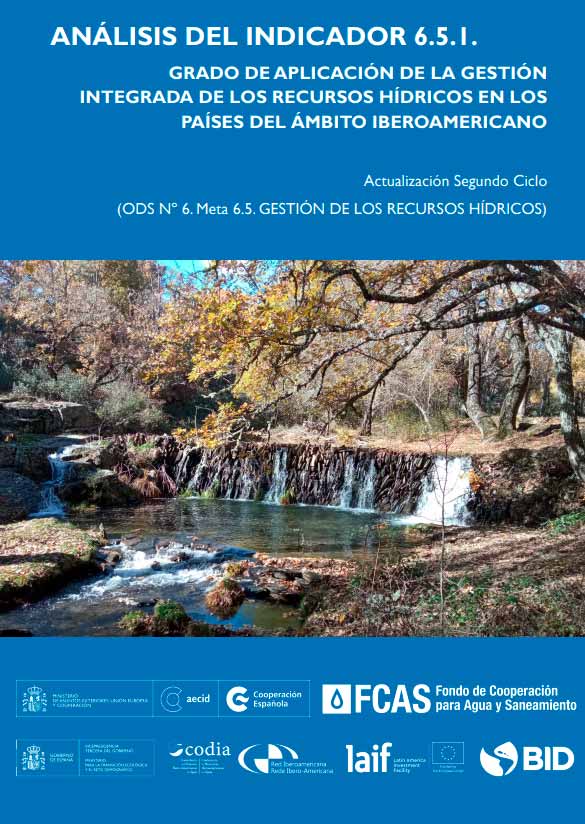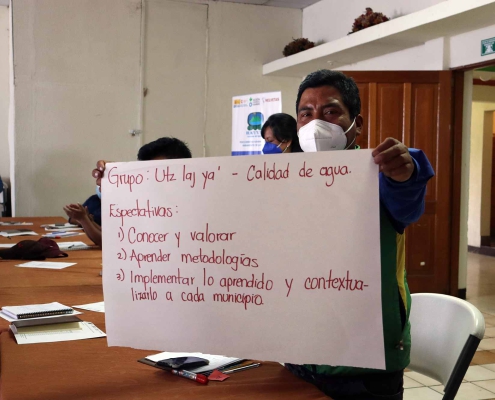Governance and Institutional Strengthening
A commitment to better water governance
A commitment to better water governance
Institutional Strengthening has always been one of the fundamental pillars of the Fund’s work, which is committed to better water governance in its broadest sense. This is done in several ways. On the one hand, by promoting Integrated Water Resources Management (IWRM) to foster joint use and management of water resources and the adoption of basins and aquifers as planning and management units; on the other hand, by strengthening communities, institutions and public bodies in the recipient countries; and on the other hand, by strengthening the capacity of the public institutions and bodies in the recipient countries to manage water resources in a sustainable manner.

Work has been carried out to develop strategic actions within the framework of hydrological planning, Integrated Water Resources Management and the model of basin organisations, always addressed to adaptation to climate change.
During 2021, the Fund has supported various studies, in collaboration with the Permanent Technical Secretariat of the Conference of Ibero-American Water Directors (CODIA) and the Inter-American Development Bank (IADB), on the degree of compliance with the SDG6 indicators in Ibero-American countries. In December, together with CODIA, an updated “Analysis of Indicator 6.5.1. Degree of Application of Integrated Water Resources Management in Ibero-American Countries. Second Cycle Update” was published. This study, initially conducted in 2019, was updated in 2021 to include the comparative progress, based on the results gathered by the Second Cycle of assessment of indicator 6.5.1, launched by UN-Water.
Both the 2021 update and the original version published in 2019, can be downloaded here (Spanish).
In addition, important work has been carried out to accompany partner countries, including the following actions in 2021 (further information in Section “Impacts in public policies” in this Report): Assisting the General Directorate of Water Resources of Honduras (DGRH-H) in the public information phase of the Regulations of the General Water Law (response to allegations presented); assisting the Ministry of Environment and Natural Resources of El Salvador in the revision of the draft of the General Water Resources Law, which is expected to be approved in 2022; assisting the National Institute of Water Resources of the Dominican Republic in the drafting of the country’s National Water Resources Development Plan; carrying out various tasks to draft the Technical Guide for Hydrological Planning within the framework of IWRM for Ibero-America and assisting the Bolivian Ministry of the Environment and Water in the drafting of Drought Management Plans and the National Institute of Water Resources of Cuba in the definition of training programmes and practices for the institution’s technicians and managers
In order to promote greater sustainability of water and sanitation services, the Fund provides support to service operators. For this purpose, a number of activities are being promoted, which fall into the following typologies:
Some of these activities are being promoted through the technical cooperation programmes based on funds from the regional LAIF programme and the Fund: both have a strategic line focused on strengthening operators, which is managed in collaboration with the IADB. On the other hand, some activities are being promoted directly by the Directorate for Cooperation with Latin America (DCALC), some of a transversal nature and others of a local nature in specific countries.

The Water Fund views capacity development holistically, as a way of helping all actors in the water and sanitation sector to achieve SDG 6 and the fulfilment of Human Rights to Water and Sanitation. This line of work therefore encompasses a wide range of activities aimed at broadening knowledge and improving both partner countries’ practices and our own work. All of this, while always facilitating the partner country’s leadership in its own development process.
Within capacity-building, work is carried out through multiple processes and using a variety of tools:
The work is also carried out at the various levels with which it interacts, so that the knowledge acquired permeates all the actors with whom it works, thus ensuring the sustainability of the programmes:
In addition, workshops to exchange of experiences between countries are also facilitated and funded regionally, and common recommendations are developed. In this line, the Fund maintains a close relationship with CODIA (Conference of Water Directors for Latin America) and supports the work of regional networks such as RIOCC (Ibero-American Network of Offices against Climate Change) or CIMHET (Ibero-American Meteorological and Hydrological Service Directors Conference). This networking is based on the conviction that working together with our partners in the whole process will offer a better and more sustainable exchange of experiences and knowledge, which will be useful both for the countries and for the cooperation policies themselves.
The ultimate goal is to work hand in hand with institutions and communities to strengthen institutions and promote human rights to water and sanitation, as well as public policies that favour resource sustainability.